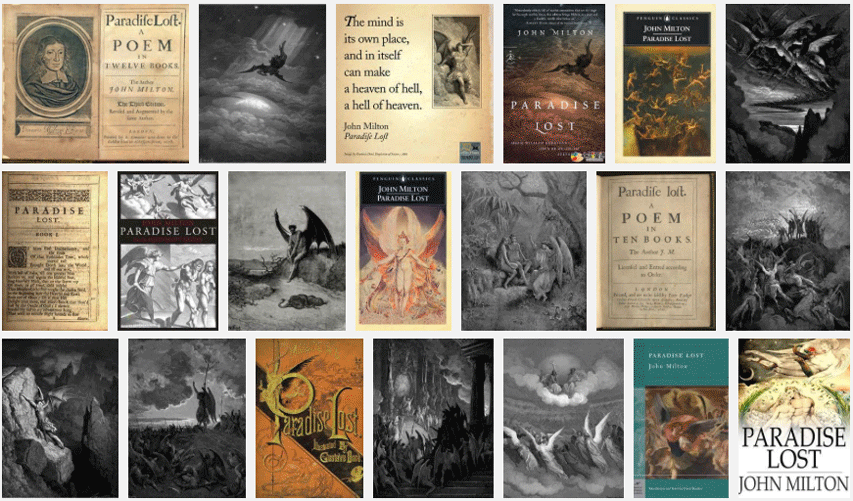September 4, 2016
Paradise Lost

"...justify the ways of God to men..."
Early this summer, I listened to two audiobooks, Milton's Paradise Lost and Paradise Regained and the Great Courses lecture by Professor Seth Lerer, the Life and Writings of John Milton. (An aside that I find interesting: the first audiobook is illustrated with an image of Paul Gaugin's sculpture, one that I had the fortune to see in person at the Getty Museum in Los Angeles a few years ago.)
Here is a shorter synopsis of Milton's life and work by Jonathan Rosen in the 2008 New Yorker for those of you who won't yet buy the Seth Lerer lecture. Both I highly recommend.
What sticks with me at the end of summer 2016 (apart from Milton's collapse and fusion of ancient and -for him- contemporary literary forms) is how differently Milton rendered Satan and G-d, the former in a glory of similes and the latter in the absence thereof. The two initial books of Paradise Lost are a torrent of similes that delineate Satan. I immediately thought of art and representation, of rebellion and transgression's key role in art history, of how artists in general could be compared to the fallen angel.
I won't be able to summarize Lerer's brilliant lecture, you'll have to listen to it yourself. But here is a link that touches on somewhat the same territory, Elle Irwin's 2012 An Analysis of a Literary Device - The Epic Simile in Milton's Paradise Lost. Irwin says that not only does Milton employ epic similes when rendering the fallen, but they are cascading in descending order, the rhetorical devices are themselves falling in a controlled demolition:Milton's similes bring sympathy and understanding to those characters that they describe and also align the characters within the comparisons to humankind. In her article "Milton's Kinesthetic Vision in Paradise Lost" Elizabeth Ely Fuller says, "Satan's physical being has no integrity: he repeatedly changes shape and substance [...] " It could be that Satan's physical representation is what makes him relatable. Maybe Satan's lack of integrity is what makes the reader sensitive towards him. Satan begins his journey as an angel in heaven, and ends his journey as a tormenting serpent. As Satan digresses, he becomes more concrete. We see Adam and Eve follow a similar path. Before the fall, man and woman are unfamiliar because their lives are surrounded by perfection and bliss. Once they have fallen, they experience emotions that are easier for us to understand: lust, jealously, revenge. The further Satan falls from heaven, the closer he becomes to humankind and the further Adam and Eve fall, the closer they become to Satan. It is alarming that Milton aligns Satan not closely with God, but with humankind. We can never truly comprehend God; we can only understand our own sins. Milton wants us to understand evil clearly; he wants to make evil tangible so we can see it, feel it, smell it, and recreate it in our minds. We do not get this same treatment of God because God is not used in any of Milton's similes. Therefore, Milton is treating heaven supremely. Milton is in some sense playing the role that assumingly God did in Paradise Lost. God wants us to understand evil so we can know and appreciate good.
And then we come to Book 3 in Paradise Lost: to render G-d in Heaven. How does Milton tackle this challenge? Here are some notes I took from the audiobook on the fly:
Great CoursesPosted by Dennis at September 4, 2016 9:31 PM
Chapter 8 of 12Book 3:
Heaven presented as a world without texts
A world unfilled, holy, not a world of written language, a world of voices that sing
The unmediated structure of expression
No references to books or writingMilton's idea of unfilled language, rhetorical discourse: speaking
The stance of Homeric Vatic Poet, a singer, a speaker, an orator
An oral presentation of an oral Greek speechWriting is an estrangement, a fall into writing
A representation of living in the world historically
The letter, the symbol of fallennessG-d is the original author who speaks, by which things get done
In heaven, there are no similes
Paradox?: things stated as they are vs an attempt to describe the unmeasurable
Only repetitions, statements, only synonyms
Intensely repetitive
Not about figural language, metaphor, simile
Heaven is about stating what things are
Things are said rather than explained
Leave a comment